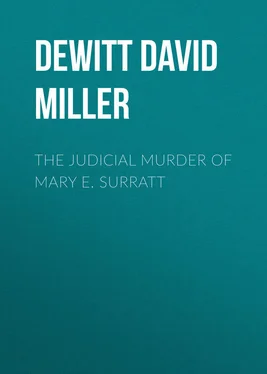David DeWitt - The Judicial Murder of Mary E. Surratt
Здесь есть возможность читать онлайн «David DeWitt - The Judicial Murder of Mary E. Surratt» — ознакомительный отрывок электронной книги совершенно бесплатно, а после прочтения отрывка купить полную версию. В некоторых случаях можно слушать аудио, скачать через торрент в формате fb2 и присутствует краткое содержание. Жанр: foreign_antique, foreign_prose, на английском языке. Описание произведения, (предисловие) а так же отзывы посетителей доступны на портале библиотеки ЛибКат.
- Название:The Judicial Murder of Mary E. Surratt
- Автор:
- Жанр:
- Год:неизвестен
- ISBN:нет данных
- Рейтинг книги:5 / 5. Голосов: 1
-
Избранное:Добавить в избранное
- Отзывы:
-
Ваша оценка:
- 100
- 1
- 2
- 3
- 4
- 5
The Judicial Murder of Mary E. Surratt: краткое содержание, описание и аннотация
Предлагаем к чтению аннотацию, описание, краткое содержание или предисловие (зависит от того, что написал сам автор книги «The Judicial Murder of Mary E. Surratt»). Если вы не нашли необходимую информацию о книге — напишите в комментариях, мы постараемся отыскать её.
The Judicial Murder of Mary E. Surratt — читать онлайн ознакомительный отрывок
Ниже представлен текст книги, разбитый по страницам. Система сохранения места последней прочитанной страницы, позволяет с удобством читать онлайн бесплатно книгу «The Judicial Murder of Mary E. Surratt», без необходимости каждый раз заново искать на чём Вы остановились. Поставьте закладку, и сможете в любой момент перейти на страницу, на которой закончили чтение.
Интервал:
Закладка:
General Ekin welcomed the opportunity to distinguish himself by seconding the motion and characterizing the appearance of the witness before the Commission, “with such a character” as “the height of impertinence!” In his haste to insult a fallen foe, he seems to have forgotten that the witness had no alternative but to come.
The counsel for the prisoner humbly reminded the Court that the prosecution itself had sworn as its own witnesses men who had borne arms against the Government. The Judge-Advocate saw that the members of the Court had gone too far, and, after calling their attention to the familiar rule that the record of conviction in a judicial proceeding was the only basis of a total rejection of a witness, proceeded to provide a channel for the relief of the Court by suggesting that they could discredit the witness upon the ground stated, although they could not declare him incompetent to testify.
The assertion is confidently made that in the whole annals of English criminal jurisprudence, full as they are of instances of the grossest unfairness to persons on trial, no such outrage upon the administration of justice as the foregoing can be found. To find its parallel you must go to the records of the French Revolutionary Tribunal. What are we to think of the complaint of a Union General, that “a rebel party” fired (first? No! but that when “it became his duty as an officer to fire upon a rebel party” the rebel party fired) back? What in Mars’ name did this warrior expect? Would he have had kinder feelings towards his brave adversary if, in response to his own volley, the Confederate General had tamely laid down his arms, or played the coward and run?
Nowadays, when the blue and the gray meet, charges of infamy are no longer heard, but the more deadly the past warfare, the greater the reciprocal respect.
However, this unprovoked assault upon an unoffending officer, powerless to repel it, although it did not result in his ejection from the Court, effectually disposed of General Johnson as a witness.
In answer to the questions of counsel he calmly gave his testimony, which exploded both Von-Steinacker and his story. Judge Bingham confined his cross-examination to eliciting the facts, that the witness had graduated from West Point, served in the U. S. Army until 1861, resigned, and joined the Confederate Army. The Court paid no attention to his direct testimony because he had fired upon Union men when they had fired upon him.
The foregoing incidents conclusively show (were any such demonstration necessary) that a Board of nine military officers, fresh from service in the field in a bloody civil war, with all the fierce prejudices naturally bred by such a conflict hot within their bosoms, was the most unfit tribunal possible to administer impartial justice to eight persons charged with the murder of the Commander-in-Chief of the Army to which every member of the Court belonged, committed in aid of that Rebellion which during four years of hard fighting they had helped to suppress.
CHAPTER III.
The Conduct of the Trial
The whole conduct of the trial emphasizes this conclusion. The Court, in weighing the evidence, adopted and acted upon the following proposition; that any witness, sworn for any of the prisoners, who had enlisted in the Confederate service, or had at any time expressed secession sentiments, or sympathized in any way with the South, was totally unworthy of credit. The Court went a step farther, and adopted the monstrous rule that participation in the Rebellion was evidence of participation in the assassination! This assertion now seems incredible, but it is fully attested by the record. At one stage of the trial, the Judge-Advocate asked a witness whether or not the prisoner Arnold had been in the military service of the rebels. General Ewing, his counsel, strenuously objected to this question on the ground, that it tended to prove the prisoner guilty of another crime than the one for which he was on trial, and thus to prejudice him in the eyes of the Court.
Judge Holt remarked: “How kindred to each other are the crimes of treason against a nation and assassination of its chief magistrate.
“The murder of the President * * * was preëminently a political assassination.
“When, therefore, we shall show, on the part of the accused, acts of intense disloyalty, bearing arms in the field against the Government, we show with him the presence of an animus towards the Government which relieves this accusation of much, if not all, of its improbability.”
He asserted that such a course of proof was constantly resorted to in criminal courts; and when General Ewing challenged him (as well he might) to produce any authorities for such a position, he called upon the indomitable Bingham to state them.
The Special Judge-Advocate responded, but he courteously, but unmistakably, shied away from his colleague’s position and put the competency of the testimony upon another ground, viz.: that where the intent with which a thing was done is in issue, other acts of the prisoner which tend to prove the intent may be given in evidence. Here he was dealing with a familiar principle, and could cite any number of cases. He then proceeded to apply his good law. How? By claiming that conspiracy to murder having been laid in the charge, “ with the intent to aid the Rebellion ,” that was the intent in issue here, and therefore to prove that a man was in the Rebellion went to prove that intent.
At the request of General Ewing he read the allegation which ran “in aid of the Rebellion,” and not “ with intent to aid,” and the counsel pointed out that that was “an allegation of fact, and not of intent;” but the Judge insisted that it was in effect an allegation of intent – implied if not expressed.
General Ewing then replied to his adversary’s argument by showing that such an allegation was an unnecessary allegation. Conspiracy to murder and attempted murder were crimes done with intent to kill ; and it was a matter of no moment in pleading to allege a general intent to aid the Rebellion. Courts had no right to violate the laws of evidence because the prosecution has seen fit to violate the laws of pleading.
Judge Bingham contended (and cited authorities) for his familiar law, and then again in applying it triumphantly asked:
“When he [Arnold] entered it ( i. e. , the Rebellion) he entered into it to aid it, did he not?”
“Mr. Ewing. He did not enter into that to assassinate the President.”
At this, the Assistant Judge-Advocate rising to the decisive and culminating point of his argument gave utterance to the following proposition:
“Yes: he entered into it to assassinate the President; and everybody else that entered into the Rebellion entered into it to assassinate everybody that represented the Government, that either followed the standard in the field, or represented its standard in the counsels. That is exactly why it is germane.”
And, thereupon, the Commission immediately overruled the objection. General Ewing told the exact truth, without a particle of rhetorical exaggeration, when, in the closing sentence of his argument against the jurisdiction of the Commission, he exclaimed:
“Indeed, the position taken by the learned Assistant Judge-Advocate * * * goes to this – and even beyond it – namely, that participation in the Rebellion was participation in the assassination, and that the Rebellion itself formed part of the conspiracy for which these men are on trial here.”
Throughout the whole trial, the Commission took the law from the Judge-Advocates with the unquestioning docility usually manifested by a jury on such matters in civil courts. In truth, the main function of a Judge-Advocate appears to be to furnish law to the Court, as in civil courts the main function of the Judge is to furnish law to the jury. Consequently, his exposition of the law on any disputed point – whether relative to modes of procedure, or to the competency of testimony, or even to questions of jurisdiction – instead of standing on the same level with the antagonistic exposition of counsel for the accused as an argument to be weighed by the Court against its opposite in the equal scales of decision, was at all times authoritative, like the opinion of a judge overruling the contention of a lawyer. This, surely, was bad enough for a defendant; but, what was still more fatal to his chances of fair dealing, this habit of domination, acquiesced in by the Court on questions of law, had the effect (as is also seen in civil courts) of giving the same superior force to the expositions of questions of fact by the Judge-Advocate. And as this office combined the functions of a prosecuting officer with the functions of a judge, there could be no restraints of law, custom or personal delicacy, against the enforcement, with all the powers of reasoning and appeal at command, the conclusion of the Judge-Advocate upon the matters of fact.
Читать дальшеИнтервал:
Закладка:
Похожие книги на «The Judicial Murder of Mary E. Surratt»
Представляем Вашему вниманию похожие книги на «The Judicial Murder of Mary E. Surratt» списком для выбора. Мы отобрали схожую по названию и смыслу литературу в надежде предоставить читателям больше вариантов отыскать новые, интересные, ещё непрочитанные произведения.
Обсуждение, отзывы о книге «The Judicial Murder of Mary E. Surratt» и просто собственные мнения читателей. Оставьте ваши комментарии, напишите, что Вы думаете о произведении, его смысле или главных героях. Укажите что конкретно понравилось, а что нет, и почему Вы так считаете.












